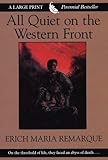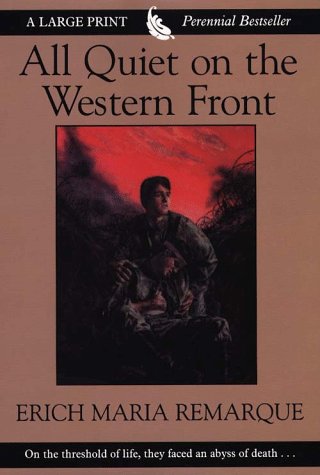
Available at Amazon Check Price Now!
All Quiet on the Western Front (Thorndike Press Large Print Perennial Bestsellers Series)
 |
Customer Rating : 
Availibility : N/A 
|
All Quiet on the Western Front (Thorndike Press Large Print Perennial Bestsellers Series) RelateItems
- All Quiet on the Western Front (Cliffs Notes)
- The Creation: An Appeal to Save Life on Earth
- Barefoot Gen, Vol. 1: A Cartoon Story of Hiroshima
- The First World War
- Survival In Auschwitz
All Quiet on the Western Front (Thorndike Press Large Print Perennial Bestsellers Series) CustomerReview
"All Quiet on the Western Front" remains the quintessential anti-war novel. The events depicted in the novel occurred almost a century ago. Remarque was a master, not only at depicting the horrors of trench warfare, which the First World War is most noted for, but also the power relations which accompany war, both within the military, and in society at large. His prose burns. Consider simply the issue of how new recruits are trained: "We became soldiers with eagerness and enthusiasm, but they have done everything to knock that out of us. After three weeks it was no longer incomprehensible to us that a braided postman should have more authority over us than had formerly our parents, our teachers, and the whole gamut of culture from Plato to Goethe...We had fancied our task would be different, only to find we were to be trained for heroism as though we were circus-ponies." Yes, "braided postman."
I first read this work over 40 years ago, before I entered the Army. It proved to be the best "orientation manual" possible for what the military would be like, despite the fact that Remarque depicted the German Army of World War I, and I was in the American Army in Vietnam. There were several passages that I remembered, and they proved to be astonishingly prescient. For example, the manner is which Kat died in the book, and Paul's utter surprise that he was actually dead from such a small wound reflected the first casualty I treated, a Lieutenant who was just so unlucky to have gotten hit where he did. But on this re-read, I was impressed with how many other portions were also relevant. Remarque brilliantly depicted the immense emotional dissonance that Paul experienced on leave, with his fellow citizens of the home front who were always so willing to pat him on the back, and buy him a beer, and then pontificate in their excruciatingly clueless manner about what was needed to "really win this war." And then there are the hospitals, as Remarque says: "A hospital alone shows what war is." The author depicts the suffering of the soldiers, and the sometimes callousness of the staff that could be drawn from the recent news articles on the scandals at Walter Reed Hospital. Remarque even includes the physicians, as he and I would both say, a very slender minority, but nonetheless real, who see the war and their "captive audience" as a wonderful laboratory to experiment - in this book's case it was a surgeon who loved to break feet, in an always failing attempt to cure "flat feet."
War can make a liar out of you. Paul Baumer is home on leave. He knows the agonizing way that Kemmerich died. He has to see his mother, who wants to hear the entire, honest truth. There is no way he can tell her; there is no way that he can say your son died for nothing at all. He has to say: Your son died a hero, and he died instantly. As to the truth: "I will never tell her, she can make mince-meat out of me first. I console her..." In another scene Paul is in a shell crater, a Frenchman also jumps in it, and Paul instinctively has to kill him. From his papers he learns that he is Gerald Duval, a printer. Paul realizes that he is just another poor slob who got caught up in the war, and didn't make it. In the crater, Paul makes a promise to him: "I promise you, comrade. It shall never happen again." As we all know, not only again, but again and again it continues to happen.
Remarque brilliantly depicts the nitty-gritty of war, from the lice to the rats. In his case, much time was spent scrounging for food, which was one of the real differences with the American Army in Vietnam. It might have bland, but the food was always adequate for us. But he is equally adept at addressing the larger issues of why wars occur, and in one scene, after they had been issued new clothes (which were later collected!) for the Kaiser's inspection, the infantrymen ask each other if he could have prevented the war. The conclusion was, no, not him alone, but if only 30 people, those with the power, had said no, there would have been no war. Remarque has an excellent passage, worthy of Pascal's ruminations questioning the right to kill a man because "he lives on the other side of the river." Remarque says: "A word of command has made these silent figures our enemies; a word of command might transform them into our friends. At some table a document is signed by some persons whom none of us knows, and then for years together that very crime on which formerly the world's condemnation and severest penalty fell, becomes our highest aim... Any non-commissioned officer is more of an enemy to a recruit, any schoolmaster to a pupil than they are to us."
This book should be a requirement before any student can graduate from high school. Even more so, it should be an essential curriculum item in any journalism school; the last two brief paragraphs explain the title to the book, and that aspiring journalist might hesitate in ever writing: "MACV reported that there was only light and scattered fighting in the Central Highlands." Or, on the Western Front, or in Helmand province.
*** Product Information and Prices Stored:Apr 04, 2010 08:40:23